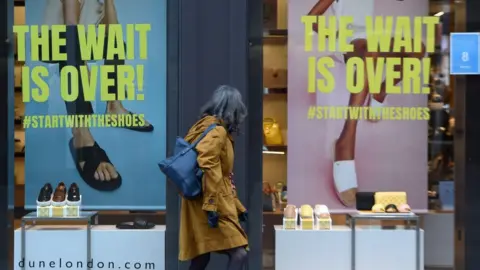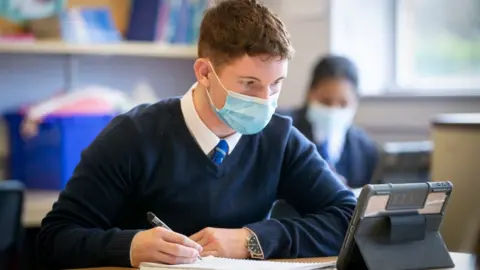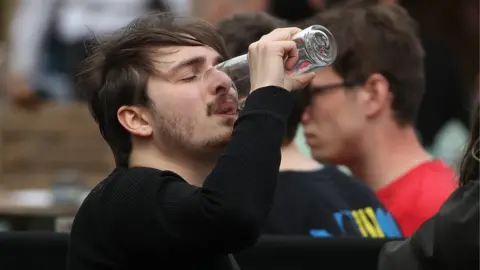Covid in Scotland: Most restrictions to end from 9 August
 Getty Images
Getty ImagesAlmost all of Scotland's remaining Covid-19 restrictions are to end from 9 August, Nicola Sturgeon has confirmed.
Social distancing will be dropped in most settings, meaning more capacity in pubs and restaurants and larger crowds at sporting events and concerts.
And close contacts of those who test positive for Covid will no longer have to self-isolate - as long as they are fully vaccinated and test negative.
However, the wearing of face coverings in some public spaces will continue.
This will include secondary schools, where staff will need to maintain 1m physical distancing for the first six weeks of term and twice-weekly testing will be required.
The first minister also said a "gradual approach" will be taken to returning workers to offices, warning that the virus still poses "real challenges".
While the changes would restore a "substantial degree of normality", she said they do not "signal the end of the pandemic or a return to life exactly as we knew it".
She said: "Declaring freedom from or victory over this virus is in my view premature."
The number of new Covid-19 cases has fallen markedly from the peak of the "third wave", with Ms Sturgeon saying the infection rate had fallen by two-thirds since early July.
The percentage of tests coming back positive has also fallen, as has the number of patients being admitted to hospital and intensive care wards with the virus.
The first minister said uptake of the Covid-19 vaccine had been "exceptional", and that this - along with the fall in cases - made it possible to lift most of the legal restrictions still in force.
From Monday, 9 August, the current limits on the number of people who can meet up will be dropped, as will social distancing rules in most settings.
This means nightclubs will be allowed to reopen, and larger crowds will be allowed to gather for indoor and outdoor events - although organisers of large events will still need to apply to local councils for permission.
The rules around self-isolation will also change, meaning that fully-vaccinated adults who are identified as a close contact of a positive case will no longer have to isolate if they return a negative PCR test.
 PA Media
PA MediaThe government is still considering whether a certificate proving people have been vaccinated will be needed to enter "higher-risk" events.
Ms Sturgeon confirmed that a "Covid status certification" app was under development, but said she was "considering very carefully" whether such a scheme would be appropriate.
She also said she would not hesitate to take the "tough decision" to re-impose some local restrictions if there was a serious outbreak of the virus, saying the government "will seek to take whatever action is necessary to keep the country safe".
While most restrictions will be lifted, a number of "mitigations" will remain in place, with Ms Sturgeon saying the harm of the virus "cannot be underestimated".
The use of face coverings in enclosed spaces like shops, hospitality venues and public transport will remain "for some time" to come, and venues will still be expected to collect customer details for contact tracing.
The first minister said it was "vital" that the return to working in offices was a gradual one, saying employers should consider a "hybrid" model of home and in-office work.


Two weeks after restrictions were lifted in England, the predicted spike of 100,000 new cases a day has not materialised.
That bodes well for Scotland to follow suit. Scotland was the first part of the UK to see a big surge in cases at the start of July but since then the data has been positive and even the more cautious scientists say it looks good to proceed.
Some experts believe one thing that has helped is that behaviour has not significantly changed. We are not in contact with as many people, and many have continued to keep a distance.
With vaccines doing such an amazing job, could small efforts like this be enough to keep the virus at bay?
What is around the corner is a bit tricky to predict.
We will see a return to schools and universities in the next few weeks, coupled with the end of the holiday season and cooler weather on the horizon. That's why things like the wearing of face coverings and an encouragement to work from home will continue for now.
The hope is the worst is behind us, but Covid has taken us by surprise before - it still could now.

The move was broadly welcomed by business groups, although some still voiced fears about the economic recovery.
The Federation of Small Businesses said firms would be "elated" that the bulk of curbs were being lifted, but trading conditions had been "permanently changed by the crisis".
CBI Scotland said moving beyond level zero "creates a much-needed platform for kickstarting Scotland's economic recovery", but said firms would be "confused" about why ministers were still advising people to work from home.
And the Scottish Beer and Pub Association said hundreds of pubs would now reopen for the first time, hailing this as "fantastic news" - adding that it was "vital that we get the recovery phase right".
 PA Media
PA MediaThe Scottish Parliament was recalled from its summer recess for the announcement, giving opposition leaders the chance to question the first minister on the plans.
Scottish Conservative leader Douglas Ross said the statement was a "mixed bag", saying that "ongoing restrictions will hold Scotland's recovery back".
He said: "We have moved beyond level zero - but still curbs remain in place. Yet again the goalposts have been moved. We are at level minus one or minus two, and still the government is clinging on to parts of people's lives."
Scottish Labour leader Anas Sarwar said there was "definitely light at the end of the tunnel", but said "we are at a crucial point for Scotland's recovery".
He called for a "new approach" in the fight against the pandemic, calling for increased support for the test and trace system and pop-up vaccination clinics at sporting events and universities.


Do you have a question about the Covid restrictions in place in Scotland? Use the form below to send us your questions and we could be in touch.
In some cases your question will be published, displaying your name, age and location as you provide it, unless you state otherwise. Your contact details will never be published. Please ensure you have read the terms and conditions.
If you are reading this page on the BBC News app, you will need to visit the mobile version of the BBC website to submit your question on this topic.


